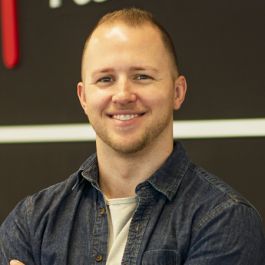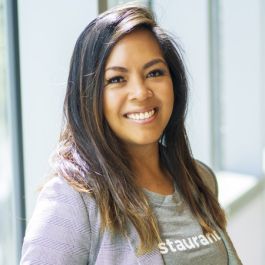When you first walk into a restaurant, what do you see?
Often, it’s a member of the restaurant’s staff — likely a host, ready to greet your party and guide you to an available table. Once seated, you’ll soon be met by a server, who can answer questions about the menu, address any other concerns you might have and promptly return to take everyone’s orders. Dinner is served, food is enjoyed, the bill is paid, and round and round it goes.
Though this experience seems straightforward for diners, it’s very different for those working out of sight to keep all the plates spinning. That’s where Restaurant365 comes in.
According to Alex Ripberger, lead product designer, there’s “a much larger world behind the scenes” that the thriving restaurant tech company works to support. Focused on back-of-house logistics, Restaurant365’s cloud-based platform allows restaurants to more efficiently manage accounting, payroll, scheduling, inventory and other internal processes.
“You don’t often think about accounting through software or taking inventory as a process, but it’s all these [less visible] actors that make a restaurant possible,” Ripberger added.
“Before they can take your order, servers need to be scheduled, and managers work diligently to accommodate the varying availability of those employees,” said Cristalle Jaramilla, director of engineering at Restaurant365. The platform supports such daily logistics while integrating with suppliers, so that restaurants can keep track of inventory and automatically order more ingredients before they run out, and gathering sales data, so that restaurant chains can evaluate the relative financial health of each location. “Not only do we help restaurants operate, but we account for them too,” she said.
At the Irvine-based company, employees dive deep into hospitality businesses’ inner workings in order to help them digitize and simplify their accounting and back-office operations.
In other words, restaurant employees “spend less time doing paperwork,” said Aaron Johnson, a senior sales manager focused on small- and medium-sized businesses (SMB) in Restaurant365’s customer base. Instead of writing down inventory before transferring that information to a computer system — still a common practice in many restaurants — “employees can take inventory on their phone, which streamlines their day,” Johnson added.
As the food-service industry slowly recovers from pandemic-induced hardships, with lingering challenges such as labor shortages and rising food costs, restaurant operators are relying upon technological innovation to increase efficiency, decrease costs and improve their overall profitability. Though such advancements were adopted rapidly in response to the pandemic, the customers of today demand that restaurants continue to provide online ordering, fast digital pay and digital menus — and restaurant employees expect similarly long-term enhancements to make their work more manageable in and around the kitchen.
That push toward industry-wide advancement — especially on the heels of a volatile period that devastated the restaurant business — is all part of the appeal for employees at Restaurant365, as is keeping individual hospitality workers in mind. “The restaurant industry is already known for the amount of hours that people need to work,” Johnson said. “If we can get people’s ten- or eleven-hour days compressed down to eight- or nine-hour days, so that they’re working regular shifts, that’s an amazing thing to be a part of.”
Below, Jaramilla, Ripberger and Johnson told Built In about their company’s rapid growth and the unbridled passion that they consider the secret ingredient behind Restaurant365’s success.
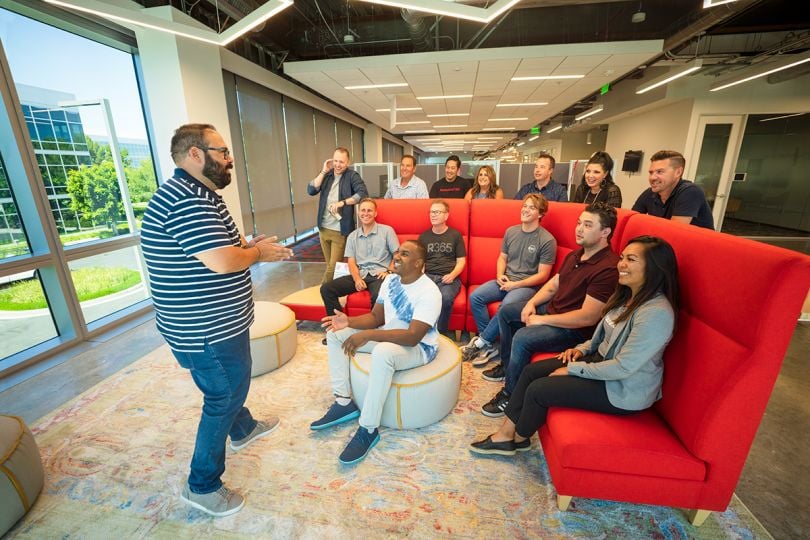
Restaurant365 has grown considerably in recent years and continues to scale rapidly as the restaurant industry recovers from the pandemic. How have your work lives been shaped by all that expansion?
Cristalle Jaramilla, Director of Engineering: We need more storage and more servers because we’re onboarding bigger customers like McDonald’s, Burger King and Paris Baguette. All these companies have multiple locations, and so we’ve been doing a lot of scaling and security research. The larger the customers get, the more engineering has been looking into how we scale out and keep up performance. And in terms of employee growth, I only had three teams when I started; now I have 12 teams, each with 10-12 people.
Aaron Johnson, Senior Sales Manager: When I came in, our SMB segment had only three team members. As of today, less than six months later, we’re at 12, and we plan to be at 16 by the end of next month. We’re bringing in a massive amount of transitions, and so our volume has quadrupled over the past few months. On our team, we’re seeing tremendous growth, and I know the same is true for the mid-market segment.
We can tell that the restaurant industry is bouncing back, because we’re bringing on more customers, servicing more people and doing so successfully. Restaurant365 is very low-churn, and so we’re not only adding more customers but holding them.
To what do you attribute that low churn rate?
Alex Ripberger, Lead Product Designer: We involve and listen to our customers. At the end of a recent interview call going over tests of one prototype, one person introduced themselves as the client company’s director of operations and said, “It’s amazing that you’re involving us in this because this has not been our experience with other restaurant-focused software companies in the past. Most are just like, ‘We’ll build this for us, and you’ll love it. Just trust us.’” Whereas we partner with clients to make something that works for them. Having that back-and-forth while building something is just one way we see all our customer relationships as partnerships.
Johnson: Our churn is also very low because no one does what we do. No one else is going to bring a restaurant’s operations, accounting and HR into one place. No one else is making that accessible with one login. We simplify customers’ days. And because we bring everything into one space, we help people save time. Rather than going into the office and needing to log into three or four software platforms, they log into one — which leads into the return on investment. With everything integrated, you make less mistakes, save your business money and ultimately find that the service pays for itself by giving you three percent back on your annual revenue.
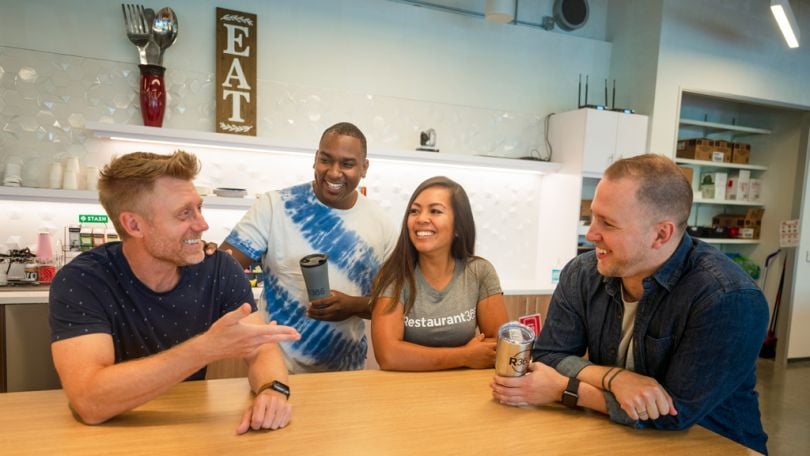
How do you see this team’s passion manifest in your day-to-day work?
Johnson: When I first came on board, we were a team of three. We doubled that number in less than a month, and in tandem, we had a new employee join us. Prior to this addition, our previous record was just under $10,000 in monthly recurring revenue (MRR), and we then doubled that. The same month he hit the floor, we hit $20,000 in MRR; I’d say that was solely due to his passion for coaching and developing people. If you get the right leaders in place, regardless of how many people they have to help, they will do so, because their natural instinct is to make other people better.
Ripberger: There’s passion for the work being done, but there’s also passion for the company. One of the first questions I asked before joining was, “What are some of the benefits of working at Restaurant365?” The recruiter answered, “Honestly, everyone’s really nice.” In my head, I went, “Oh, no! That’s what you say when you can’t think of anything else to say!” But it turned out to be so incredibly true.
Once I joined, I discovered there’s such a passion for collaboration that I haven’t experienced at other companies. Everybody’s willing to work together to reach the same goal. I can reach out to customer-service team members or engineers for assistance, and they’re happy to be involved cross-departmentally. I’m getting chills thinking about it, but it makes doing the work so much more enjoyable when you feel you’re helping your entire team to go further. I love the work I do, but there’s so much to be said for the team members who make me love the work even more.
Jaramilla: Three years ago, when we were changing our engineering approach, we did hackathons, and we noticed how motivated people were to do extra work that improved our systems. During those hackathons, people were like, “Oh, let’s improve the SQL query that takes a minute to run; we want customers to get results in seconds.” Those hackathons have evolved into “engineering tiger teams” — because they just pounce. Whenever a tiger team is triggered, people from different teams volunteer.
Could you share any stories that capture the workplace culture at Restaurant365? What does it feel like to work there?
Johnson: We grew so fast that people didn’t always get a chance to get to know each other. As such, the other managers and myself introduced the game Two Truths and a Lie. I put a $50 gift card on the line, so we made a little contest of it. The person who guessed the most correct answers won the gift card. When you’re scaling fast, especially while remote, the culture is one of the biggest elements you have to maintain. You don’t have daily in-office engagement anymore, so you need activities to bring people out of their shells.
From a culture standpoint, we’re family-oriented. We have a department channel and individual team channels on Slack, and I ask that everyone says good morning when they start their day. You have to get your name out there, to let people know who belongs to their work family. And in sales, we win deals, so everyone is encouraged to share their wins for everyone to rejoice in.
Jaramilla: Each team is autonomous, but we follow certain mottos within the technology culture: trusting but verifying; working smarter, not harder; see something, say something; high collaboration, low ego; leading by doing; and succeeding or learning if we fail. Sometimes, we’ll release an update, and something fails, at which point we’ll come together as a team to figure out what happened. Every all-hands meeting, once a quarter, each team calls out their “superstar,” and they actually vote on who that superstar is. Everyone writes notes about the individual. This year, we’re also shouting out “cool things” that have come out of each team, complete with demos of what those teams have built, what technology they used, and so on.
Ripberger: The product team does a product summit once a year, whether we fly to Austin or to our headquarters in Irvine, in order to reconnect, share updates and realign on our vision. It feels meaningful to get to know people you’re working with, when you’re not in front of the camera or working on a problem but instead at dinner or Topgolf. We can hang out and have fun. Three words for our team: inviting, collaborative, passionate. It’s such a welcoming culture. I feel I can talk to any other team at any point, to bring them in on what we’re working on. Throughout all the teams, everyone is so passionate about how they can go the distance to make a product or user experience even better.
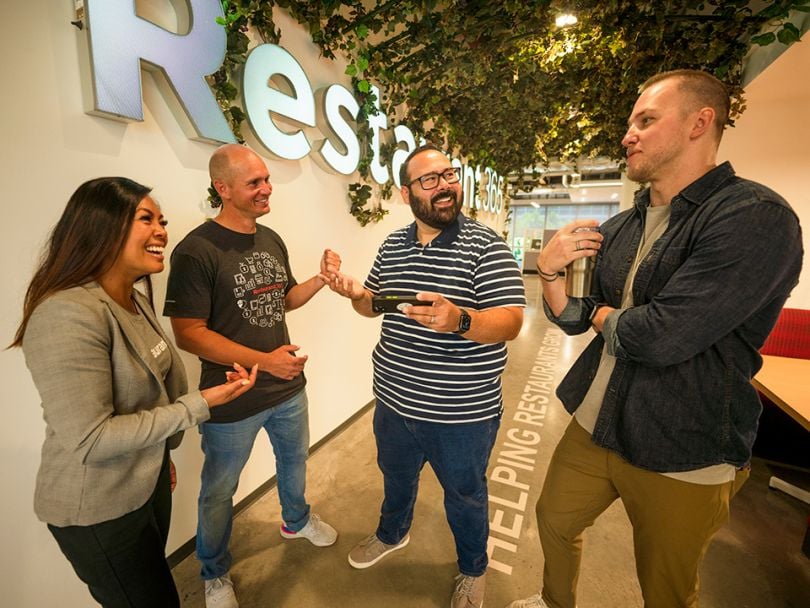
From an employee-experience standpoint, how does Restaurant365 set you all up for success in your roles?
Ripberger: I love the work-life balance. A lot of the work I’m doing doesn’t require interacting with other people, because I’m a designer. And so I’m online for the meetings that I need to be online for, I’ll be around if anybody needs to contact me, but I do a lot of my work at night. That way, I can have this other time to do things during the day and focus on the designs at night.
Jaramilla: On the engineering team, we have someone in every time zone and call ourselves a 24-hour team. If an engineering manager works late, we tell them to take back the time they need. That makes for a good work-life balance; people will put in what they need for relief, and we don’t hear from them for a day or so, and then they come back.
Johnson: I’m a single parent 50 percent of the time. The ability to be fully remote, and then additionally having a boss who enables me to be fully autonomous, was game-changing. It’s one of the main reasons I left my previous job. My life went through a major transition at the beginning of this year, and in terms of the autonomy I have at Restaurant365 — really, the flexibility I now have to be the father I want to be — there are no words for what a great place that is to be in. Family first, work second.


